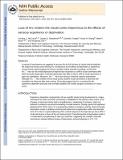Loss of Arc renders the visual cortex impervious to the effects of sensory experience or deprivation
Author(s)
McCurry, Cortina L.; Shepherd, Jason Dennis; Tropea, Daniela; Wang, Kuan H.; Bear, Mark; Sur, Mriganka; ... Show more Show less
DownloadBear-Loss of Arc renders.pdf (1.472Mb)
PUBLISHER_POLICY
Publisher Policy
Article is made available in accordance with the publisher's policy and may be subject to US copyright law. Please refer to the publisher's site for terms of use.
Terms of use
Metadata
Show full item recordAbstract
A myriad of mechanisms have been suggested to account for the full richness of visual cortical plasticity. We found that visual cortex lacking Arc is impervious to the effects of deprivation or experience. Using intrinsic signal imaging and chronic visually evoked potential recordings, we found that Arc−/− mice did not exhibit depression of deprived-eye responses or a shift in ocular dominance after brief monocular deprivation. Extended deprivation also failed to elicit a shift in ocular dominance or open-eye potentiation. Moreover, Arc−/− mice lacked stimulus-selective response potentiation. Although Arc−/− mice exhibited normal visual acuity, baseline ocular dominance was abnormal and resembled that observed after dark-rearing. These data suggest that Arc is required for the experience-dependent processes that normally establish and modify synaptic connections in visual cortex.
Date issued
2010-04Department
Massachusetts Institute of Technology. Department of Brain and Cognitive Sciences; Picower Institute for Learning and MemoryJournal
Nature Neuroscience
Publisher
Nature Publishing Group
Citation
McCurry, Cortina L. et al. “Loss of Arc Renders the Visual Cortex Impervious to the Effects of Sensory Experience or Deprivation.” Nature Neuroscience 13.4 (2010): 450–457.
Version: Author's final manuscript
ISSN
1097-6256
1546-1726